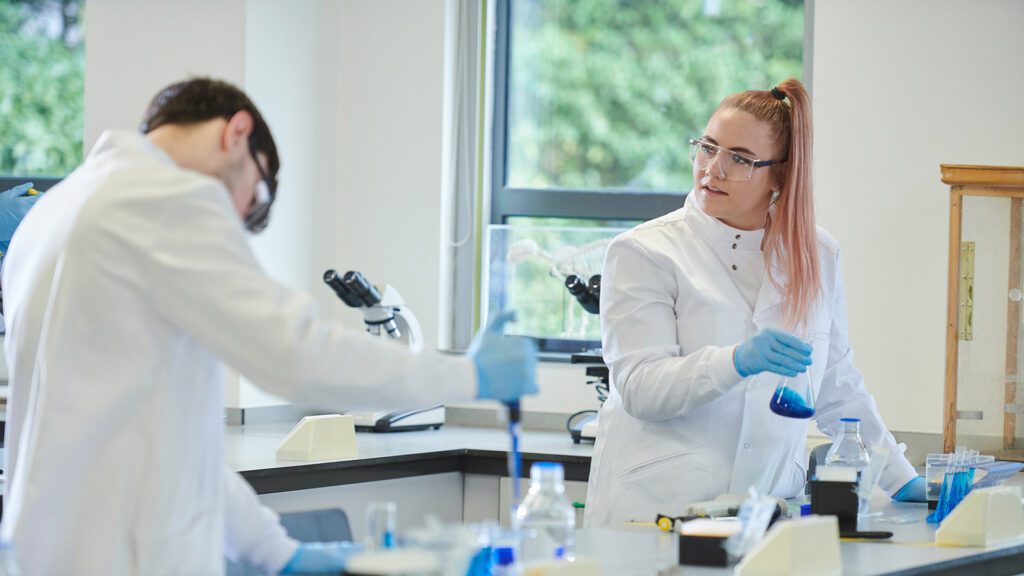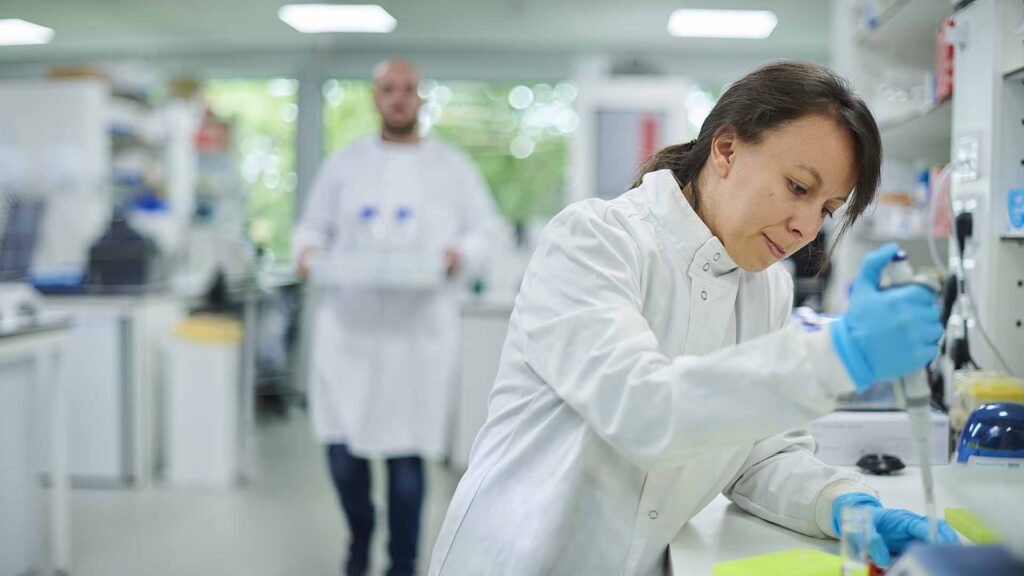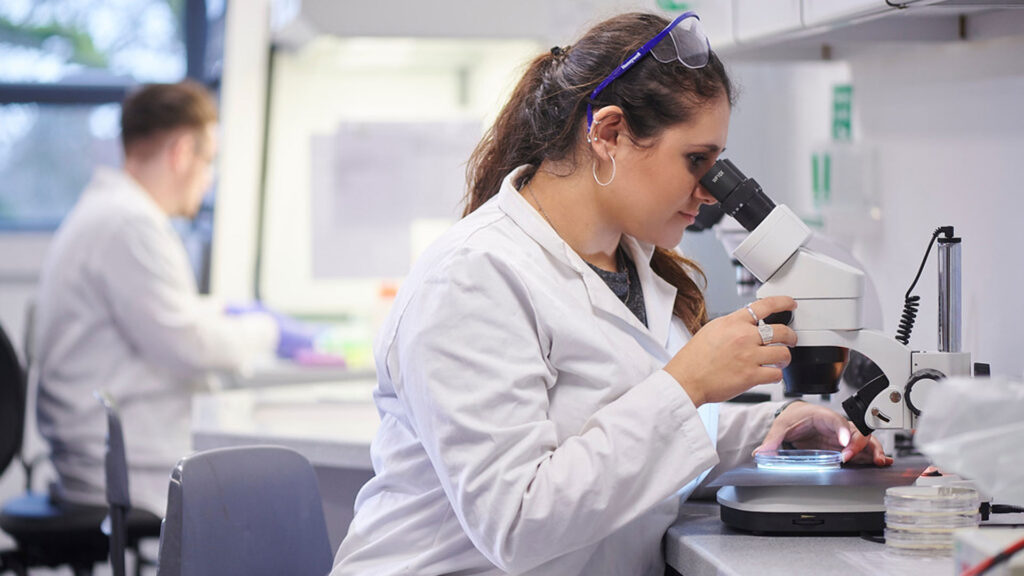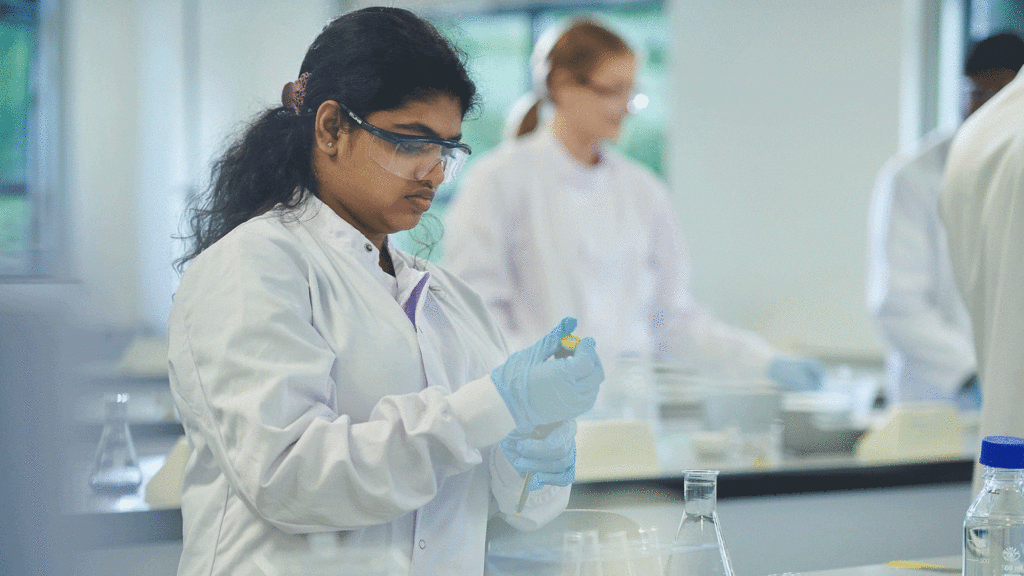Chemistry BSc (Hons)
UCAS code: F100
Combine theory and practical experience with applications of new technology. On our chemistry degree you will gain substantial experience in the labs and will be well equipped for working in the modern chemical industries.
Subject to validation.
Overview
| Course length: | 3 years full-time 4-6 years part-time |
|---|---|
| Start dates: | September 2025 |
| Location: | Edge Hill University |
| Example offers: | BBC-BBB (A Level) or DMM (BTEC) View full entry criteria |
| Subject(s): | Chemistry |
| Faculty: | Arts and Sciences |
| Department: | Biology |

What is the screen of your smartphone made of? What is meant by the term ‘legal high’? How can we fight hospital superbugs? These questions may seem unrelated, but are all topics that will be explore on our BSc (Hons) Chemistry degree.
With at least 100 hours of laboratory classes per year, you will develop your practical skills in the laboratory and gain an understanding of the challenges posed in modern chemistry and related industries.
You will gain hands-on experience using equipment in the same way as in industrial labs, focusing primarily on the areas of compound, material and environmental analysis.
On successful completion of the degree, you will be prepared for roles in variety of different fields. These could include the pharmaceutical, petrochemical, and energy industries, or even the environmental, food, and cosmetic sectors.
Course features
-
Sandwich year option available
-
International students can apply
-
Studying abroad option available
What you'll study
During Year 1 of your chemistry degree we concentrate on the fundamentals of chemistry, focusing on four areas – organic, inorganic, physical and analytical. Modules will also explore other areas that are closely related to chemistry including maths and the other sciences. You’ll also begin developing your practical skills in the labs which is the key focus and essential for professional chemists in many employment areas.
Across both theory and practical classes, you will continue to build on your knowledge and experiences in Year 2. We also introduce more complex chemistry as you begin to move from the molecular level into the macroscopic. Using modern materials and analytical chemistry, you’ll also be introduced to more powerful techniques such as coupled chromatography. The importance given to laboratory skills continues, with two lab sessions per week throughout the year.
Year 3 will begin to demonstrate the way chemistry is used in the modern world, whether in drugs and pharmaceuticals, hi-tech materials or environmental matters. As the practical approach continues, you will become adept with equipment that can be found in any modern laboratory. You will also work with an experienced, research-active academic to develop a realistic proposal, before spending a 12-week period in the laboratories conducting your investigation. This provides experience in problem solving and invention and is a good springboard for further study at Masters level and higher.
Where your course includes optional modules, these are to provide an element of choice within the course curriculum. The availability of optional modules may vary from year to year and will be subject to minimum student numbers being achieved. This means that the availability of specific optional modules cannot be guaranteed. Optional module selection may also be affected by timetabling requirements. Some restrictions on optional module choice or combinations of optional modules may apply.
How you'll study
This BSc (Hons) Chemistry utilises lecture delivery alongside practical sessions. The lectures are supported by both workshops and small-group tutorials, where material can be extended, as well as covering any problems with course material.
There are also two practical classes per week for Years 1 and 2 and in the first term of the final year. This is followed by more intensive laboratory work in the double research project module in the final term of Year 3. Typically the attendance requirement would be 15-20 hours per week, which reflects the high level of practical work contained.
How you'll be assessed
Formal assessments for all theory modules are written examinations, coupled with written coursework, both contributing to the final module mark. Formative assessment is also provided.
Because the degree programme uses stand-alone practical modules, these are also assessed by coursework and a practical examination. This is held in the laboratory, usually in the final week of term and is problem-solving in nature, based on that term’s work.
The final year research project is assessed by a significant piece of written work and an oral examination.
Entry criteria
Entry requirements
112-120 UCAS Tariff points, including A level Chemistry at Grade C or above, or equivalent. You will also need GCSE Mathematics and GCSE English Language at Grade C or Grade 4, or equivalent.
Example offers
| Qualification | Requirement |
|---|---|
| A Level | BBC-BBB. |
| BTEC Extended Diploma (or combination of BTEC QCF qualifications) | Distinction, Merit, Merit (DMM). |
| T Level | Overall grade of Merit. |
| International Baccalaureate (IB) | We are happy to accept IB qualifications which achieve the required number of UCAS Tariff points. |
| Access to Higher Education Diploma | 45 credits at Level 3, for example 15 credits at Distinction and 30 credits at Merit or 24 credits at Distinction and 21 credits at Merit. The required total can be attained from various credit combinations. |
Please note, the above examples may differ from actual offers made. A combination of A Level and BTEC awards may also be accepted.
If you have a minimum of two A Levels (or equivalent), there is no maximum number of qualifications that we will accept UCAS points from. This includes additional qualifications such as Extended Project Qualification (EPQ), AS Levels that haven't been continued to A Level, and General Studies AS or A Level awards.
English language requirements
International students require IELTS 6.0, with a score no lower than 5.5 in each individual component, or an equivalent English language qualification.
If your current level of English is half a band, one band, or one-and-a-half bands lower, either overall or in one or two elements, you may want to consider our Pre-Sessional English course.
How to apply
Apply full-time
Read our guide to applying through UCAS to find out more about the application process.
International
Please see our international student pages for further information about how to apply as a prospective international student.
The link to apply as a part-time student will be added to this page when it is available.
Should you accept an offer of a place to study with us and formally enrol as a student, you will be subject to the provisions of the regulations, rules, codes, conditions and policies which apply to our students. These are available at www.edgehill.ac.uk/studentterms.
If you join a full time undergraduate degree at Edge Hill University, we will guarantee you the offer of a room in our halls of residence for the first year of your course.
Discover our accommodation
Facilities
BSc (Hons) Chemistry students have access to our BioSciences building that incorporates impressive, modern laboratories, offering exciting and highly relevant practical experience in some of the best equipped facilities in the country.

Where you'll study
BioSciences
Finance
Tuition fees
EU/EEA and Swiss students who have settled or pre-settled status under the EU Settlement Scheme, as well as Irish nationals, may be eligible for the UK tuition fee rate.
Financial support
Subject to eligibility, UK students joining this course can apply for a Tuition Fee Loan from the Government to cover the full cost of tuition fees. UK students enrolling on the course may also be eligible to apply for additional funding to help with living costs.
Please view the relevant Money Matters guide for comprehensive information about the financial support available to eligible UK students.
EU/EEA and Swiss students who have settled or pre-settled status under the EU Settlement Scheme may be eligible to apply for financial support. Irish nationals can ordinarily apply to Student Universal Support Ireland (SUSI). If you are an EU student who does not have settled or pre-settled status, or are an international student from a non-EU country, please see our international student finance pages.
Your future career
You’ll be prepared for roles in a variety of fields when you graduate. You may choose to work in research and development, accountancy, finance or teaching. Perhaps you’ll enter a career in the pharmaceutical, environmental, food or chemical industries. The energy, polymer or petrochemical industries may be more where you’d like a career. Or maybe you’ll choose to further your studies with a postgraduate degree. You’ll be well equipped for whatever your future ambitions may be.











